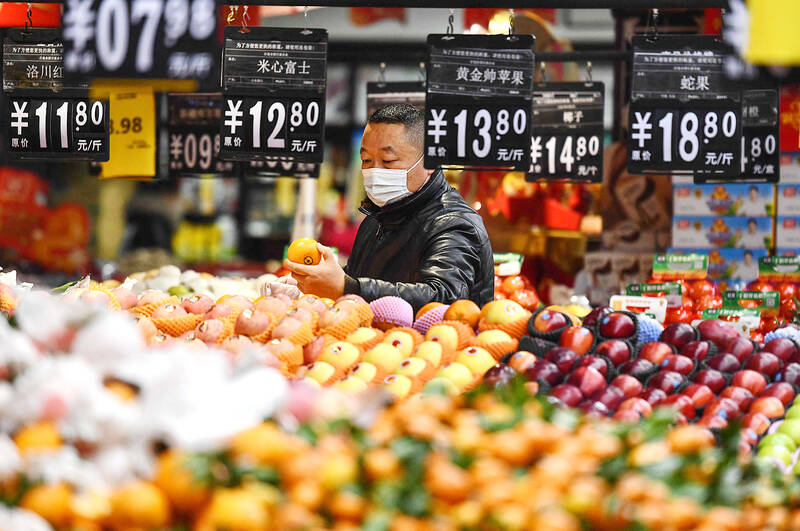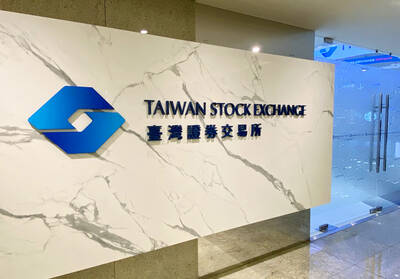Chinese consumer prices fell last month at their quickest rate in more than 14 years, data showed yesterday, piling pressure on the government for more aggressive moves to revive the country’s battered economy.
The 0.8 percent drop in the consumer price index, announced by the National Bureau of Statistics, marked the fourth straight month of deflation and was much bigger than the 0.5 percent fall forecast in a survey by Bloomberg News.
The reading was the worst since the second half of 2009, during the global financial crisis.

Photo: AFP
Meanwhile, a 2.5 percent plunge in the producer price index — which measures the cost of goods leaving factories — signaled continued weakness.
China slipped into deflation in July last year for the first time since 2021 and, apart from a brief rebound in August, has been in constant decline since.
“The primary drag on inflation continued to be food prices, which fell by 5.9 percent year-on-year, the lowest level on record,” ING Bank NV chief economist for Greater China Lynn Song said.
However, he pointed to figures showing costs rising month-on-month.
“While a far cry from the above-target inflation levels seen in many other economies, these numbers do not imply China is stuck in a deflationary spiral,” Song said in a note.
“We see a high likelihood that January’s data could mark the low point for (year-on-year) inflation in the current cycle.”
China’s sinking prices are in stark contrast with the rest of the world, where inflation remains a persistent bugbear, forcing central banks to ramp up interest rates.
While deflation suggests goods are cheaper, it poses a threat to the broader economy as consumers tend to postpone purchases, hoping for further reductions.
A lack of demand can then force companies to cut production, freeze hiring or lay off workers, while potentially also having to discount existing stocks — dampening profitability even as costs remain the same.
In reaction to the woes in the world’s number two economy, markets have been among the worst-performing globally in recent months.
On Wednesday, China Securities Regulatory Commission chairmen Yi Huiman (易會滿) was replaced after overseeing a sell-off that has wiped trillions off companies’ valuations.
The losses have prompted pledges of support, with Chinese President Xi Jinping (習近平) also becoming more involved, though observers say the moves would not solve the country’s deeper economic problems, which needed to be addressed to fully restore optimism.
Stocks in mainland China rallied for a third straight day Thursday as traders welcomed the replacement of Yi, hoping for more action to kickstart a recovery.
The Shanghai Composite Index climbed 1.28 percent, or 36.21 points, to 2,865.90 on the last day before a week-long Lunar New Year break, and the Shenzhen Composite Index on China’s second exchange rose 3.17 percent, or 48.42 points to 1,577.33.
However, the Hang Seng Index in Hong Kong sank 1.27 percent, or 203.82 points, to 15,878.07.

Taiwan Semiconductor Manufacturing Co (TSMC, 台積電) secured a record 70.2 percent share of the global foundry business in the second quarter, up from 67.6 percent the previous quarter, and continued widening its lead over second-placed Samsung Electronics Co, TrendForce Corp (集邦科技) said on Monday. TSMC posted US$30.24 billion in sales in the April-to-June period, up 18.5 percent from the previous quarter, driven by major smartphone customers entering their ramp-up cycle and robust demand for artificial intelligence chips, laptops and PCs, which boosted wafer shipments and average selling prices, TrendForce said in a report. Samsung’s sales also grew in the second quarter, up

LIMITED IMPACT: Investor confidence was likely sustained by its relatively small exposure to the Chinese market, as only less advanced chips are made in Nanjing Taiwan Semiconductor Manufacturing Co (TSMC, 台積電) saw its stock price close steady yesterday in a sign that the loss of the validated end user (VEU) status for its Nanjing, China, fab should have a mild impact on the world’s biggest contract chipmaker financially and technologically. Media reports about the waiver loss sent TSMC down 1.29 percent during the early trading session yesterday, but the stock soon regained strength and ended at NT$1,160, unchanged from Tuesday. Investors’ confidence in TSMC was likely built on its relatively small exposure to the Chinese market, as Chinese customers contributed about 9 percent to TSMC’s revenue last

Taiwan and Japan will kick off a series of cross border listings of exchange-traded funds (ETFs) this month, a milestone for the internationalization of the local ETF market, the Taiwan Stock Exchange (TWSE) said Wednesday. In a statement, the TWSE said the cross border ETF listings between Taiwan and Japan are expected to boost the local capital market’s visibility internationally and serve as a key for Taiwan becoming an asset management hub in the region. An ETF, a pooled investment security that is traded like an individual stock, can be tracked from the price of a single stock to a large and

Despite global geopolitical uncertainties and macroeconomic volatility, DBS Bank Taiwan (星展台灣) yesterday reported that its first-half revenue rose 10 percent year-on-year to a record NT$16.5 billion (US$537.8 million), while net profit surged 65 percent to an unprecedented NT$4.4 billion. The nation’s largest foreign bank made the announcement on the second anniversary of its integration with Citibank Taiwan Ltd’s (花旗台灣) consumer banking business. “Taiwan is a key market for DBS. Over the years, we have consistently demonstrated our commitment to deepening our presence in Taiwan, not only via continued investment to support franchise growth, but also through a series of bolt-on acquisitions,” DBS